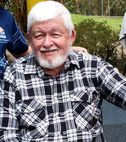Brian Joseph Prove
Full Circle of a Life Lived in Faith.

 Search...
Search...

"The crew of HMS Auckland started jumping overboard so Chris set off in a small motorboat and dragged survivors out of the sea, ignoring the bullets flying all around him. ".
- by Ian Stevenson
Christopher Goldie was born in Sydney in 1914, the youngest of 6 children, two of whom died as infants. Chris's parents separated when he was 8 years old, and his mother, Dulcie Deamer - a talented journalist, poet and author, didn't want to let raising her children get in the way of her career and lifestyle, and so abandoned them to be raised by their grandmother. As poor Grandma struggled to cope, Chris decided to set off to a Catholic boarding school in Bowral.
Chris disliked school, had poor marks and had no clear idea what he wanted to do when he left school. At one point he thought he might like to become a religious brother, so at 14 started to train for the Church, but soon dropped out to go and work on a farm.
His sister, Rosemary Goldie, who later in life become the highest ranking woman to work in the Vatican, described Chris in her memoirs as "a troubled teenager."

In 1933, just before he turned nineteen, Chris joined the Royal Australian Navy. At first he found the peacetime Navy boring, but by 1939 when World War II started, he was transferred to a new ship, HMAS Parramatta, and was sent to the Mediterranean to fight the Germans and the Italians.
To his great surprise, Chris found a new sense of responsibility that he hadn't had before. Besides being skilled at his job as the ship's electrician, he also edited the ship's newspaper, organised concerts and wrote plays that everyone on board participated in. Confirmed by one of Chris's shipmates, he became a very popular member of the crew.
HMAS Parramatta was a small warship (about 20 metres longer than a classic Manly ferry), and protected vital convoys carrying food, water and ammunition to Australian troops fighting against the Germans in North Africa. The Australians having captured the port of Tobruk and the Germans, determined in getting it back, told the world via German radio, that the Australians were surrounded and caught "like rats in a trap," so the soldiers referred to themselves jokingly as "the Rats of Tobruk."
Keeping our troops resupplied was dangerous work, because enemy aircraft and submarines could attack the convoys at any time. Everyone on board Parramatta accepted they were half a world away from their family and friends and the possibility of being wounded or killed was very real to them.
We know how Chris felt, because on his 27th birthday he wrote down exactly what happened to him that significant day. He was on shore leave and as he wandered through the town streets in the afternoon heat, he was surprised to see a little white church with its door open. He went inside where it was cool, sat down and reflected on his existence. "I wonder where I will be in a month. Where will I be in a year? Will I be alive or dead?"
Slowly he experienced a great calm come over him and he imagined he heard a voice speak to him, reassuring him that no matter what, God would always be with him.
Six days later Parramatta and her convoy came under attack from 48 Stuka dive bombers. One of the escorts, HMS Auckland, was hit by a cluster of bombs. On fire and out of control she nearly smashed into the Parramatta. The crew of Auckland started jumping overboard. Then the attacking aircraft began machine gunning them in the water.
On his own initiative, Chris set off in a small motorboat and dragged survivors out of the sea, ignoring the bullets flying around him. He brought the rescued men safely back to the Parramatta and went back for more. While he was doing all this, Auckland blew up and sank.
The Navy commended Chris for bravery for what he did that day. He saw it as no big deal - he was just doing his duty by helping others. He didn't fear death. He had come to believe that no matter what happened to him or when, God would look after him, in life and in death.
On 27 November 1941, in the dark before dawn, as Parramatta was escorting two ships loaded with ammunition for the soldiers at Tobruk, she was suddenly hit by a torpedo from the German submarine U559. Within minutes Parramatta rolled over and sank. Of the 136 men on board, only 24 survived. Chris Goldie was not one of them.
Christopher Goldie is commemorated on the Roll of Honour at the Australian War Memorial and on the Plymouth Naval Memorial.
This Remembrance Day, show your support to RSL Australia by purchasing a poppy or donate today at
Lest we forget.
Share your own story or eulogy about a loved one, online in a safe environment for future generations. Please click below.
Share their story